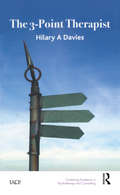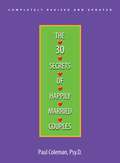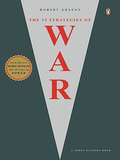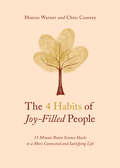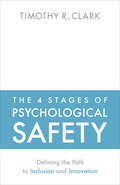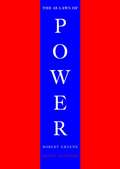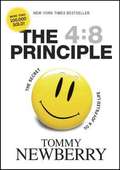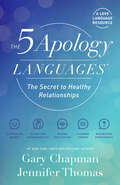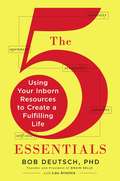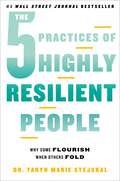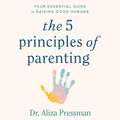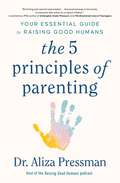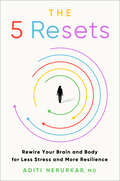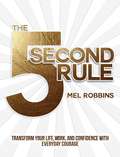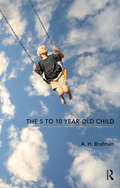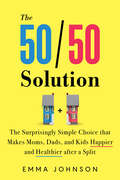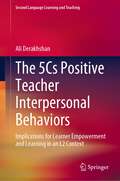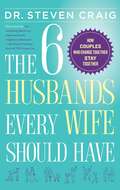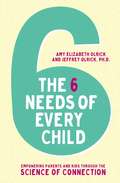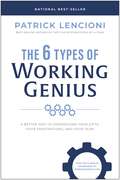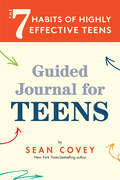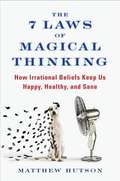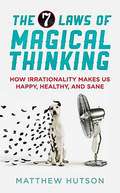- Table View
- List View
The 3-Point Therapist (The\united Kingdom Council For Psychotherapy Ser.)
by Hilary A. DaviesAn ambitious trainee therapist, determined to make her mark in the therapy world, seeks supervision and guidance. In her meetings with the 3-Point Therapist she gains much more than she had bargained for. The 3-Point Therapist is the charming story of one trainee's journey in search of professional success and recognition. What she learns is unexpected and changes her predicted path. The characters and situations in this book are purely fictional but the principles, the learning and the practice points are drawn from the author's thirty years' experience working with families in different paediatric and mental health settings. The books style is light, readable and at times humorous - but the messages are strong with far-reaching effect. The trainee and her professional practice are profoundly changed for ever.
The 30 Secrets Of Happily Married Couples
by Paul ColemanA completely revised and updated blueprint for happier marriages!It's better--and easier--to change your relationship than it is to change your partner. Based on Dr. Paul Coleman's experience with thousands of couples, this groundbreaking guide shows you thirty proven ways to do just that. In this comprehensive all new edition, Dr. Coleman offers fresh insights for a happy marriage, such as:Don't expect miracles overnight.Stop judging and start accepting.Tap into the power of small talk.Encourage each other's dreams.Reduce conversation killers.Eliminate the seven sexual myths.With The 30 Secrets of Happily Married Couples on your bedside table, you can make your marriage stronger and happier--whether you've been married for five days or fifty years!
The 33 Strategies of War
by Joost Elffers Robert GreeneBrilliant distillations of the strategies of war--and the subtle social game of everyday life--by the bestselling author of The 48 Laws of Power and MasteryRobert Greene's groundbreaking guides, The 48 Laws of Power, The Art of Seduction, and his latest book, Mastery, espouse profound, timeless lessons from the events of history to help readers vanquish an enemy, ensnare an unsuspecting victim, or become the greatest in your field. In The 33 Strategies of War, Greene has crafted an important addition to this ruthless and unique series.Spanning world civilizations, synthesizing dozens of political, philosophical, and religious texts and thousands of years of violent conflict, The 33 Strategies of War is a comprehensive guide to the subtle social game of everyday life informed by the most ingenious and effective military principles in war. Structured in Greene's trademark style, The 33 Strategies of War is the I-Ching of conflict, the contemporary companion to Sun Tzu's The Art of War.Abundantly illustrated with examples from history, including the folly and genius of everyone from Napoleon to Margaret Thatcher, Shaka the Zulu to Lord Nelson, Hannibal to Ulysses S. Grant, as well as movie moguls, Samurai swordsmen, and diplomats, each of the thirty-three chapters outlines a strategy that will help you win life's wars. Learn the offensive strategies that require you to maintain the initiative and negotiate from a position of strength, or the defensive strategies designed to help you respond to dangerous situations and avoid unwinnable wars. The great warriors of battlefields and drawing rooms alike demonstrate prudence, agility, balance, and calm, and a keen understanding that the rational, resourceful, and intuitive always defeat the panicked, the uncreative, and the stupid. An indispensable book, The 33 Strategies of War provides all the psychological ammunition you need to overcome patterns of failure and forever gain the upper hand.
The 4 Habits of Joy-Filled People: 15 Minute Brain Science Hacks to a More Connected and Satisfying Life
by Marcus Warner Chris M. CourseyIs joy the icing on the cake of life—or the fuel on which it runs?Are some people just born happy? Most of us grew up thinking that joy is random and fleeting, instead of something we can actually count on or build our life around. But brain science has revealed that joy is the perfect word to describe the fuel on which our brains run. So how do we live a joy-filled life?Marcus Warner and Chris Coursey show us how to build habits that fill our lives with greater joy and satisfaction. Based on the latest neuroscience and attachment theory—but written in everyday language—The 4 Habits of Joy-Filled People is practical and easy to comprehend. The authors provide exercises and tools you can put into practice immediately.Joy is possible. It doesn&’t have to be a random experience that catches you off guard now and then. Some of the most joyful people have endured unbelievable trauma.Joy-filled living expands our world. It makes life an adventure and teaches us to live for what is truly satisfying. Discover the skills and habits you can develop that will enhance your very quality of life.
The 4 Stages of Psychological Safety: Defining the Path to Inclusion and Innovation
by Timothy R. ClarkThis book is the first practical, hands-on guide that shows how leaders can build psychological safety in their organizations, creating an environment where employees feel included, fully engaged, and encouraged to contribute their best efforts and ideas.Fear has a profoundly negative impact on engagement, learning efficacy, productivity, and innovation, but until now there has been a lack of practical information on how to make employees feel safe about speaking up and contributing. Timothy Clark, a social scientist and an organizational consultant, provides a framework to move people through successive stages of psychological safety. The first stage is member safety-the team accepts you and grants you shared identity. Learner safety, the second stage, indicates that you feel safe to ask questions, experiment, and even make mistakes. Next is the third stage of contributor safety, where you feel comfortable participating as an active and full-fledged member of the team. Finally, the fourth stage of challenger safety allows you to take on the status quo without repercussion, reprisal, or the risk of tarnishing your personal standing and reputation. This is a blueprint for how any leader can build positive, supportive, and encouraging cultures in any setting.
The 48 Laws Of Power
by Joost Elffers Robert GreeneCunning, instructive, and amoral, this controversial bestseller distills 3,000 years of the history of power into 48 well-explicated laws.
The 4: The Secret to a Joy-Filled Life
by Tommy NewberryThis book is comparable to the Prayer of Jabez, in that it takes a biblical principle and helps enlighten readers how one simple truth can affect a wide area of one's life. Ultimately, this book will help readers fulfill their destiny as purposeful children of God by embracing the message of Philippians 4:8.
The 5 Apology Languages: The Secret to Healthy Relationships
by Gary Chapman Jennifer Thomas&“I said I was sorry! What more do you want?&”Even in the best of relationships, we mess up. We say and do things we deeply regret later on. So we need to make things right. But just saying you&’re sorry isn&’t enough. That&’s only the first step on the road to restoration.In The 5 Apology Languages, Gary Chapman, the #1 New York Times bestselling author of the 5 Love Languages®, partners with Jennifer Thomas to help you on the journey toward restored relationships. True healing comes when you learn to:Express regret: &“I&’m sorry.&”Accept responsibility: &“I was wrong.&”Make restitution: &“How can I make it right?&”Plan for change: &“I&’ll take steps to prevent a reoccurrence.&”Request forgiveness: &“Can you find it in your heart to . . . ?&”Don&’t let hurts linger or wounds fester. Start on the path to healing today and discover how meaningful apologies can make your friendships, family, and marriage stronger than ever before.
The 5 Apology Languages: The Secret to Healthy Relationships
by Gary Chapman Jennifer Thomas&“I said I was sorry! What more do you want?&”Even in the best of relationships, we mess up. We say and do things we deeply regret later on. So we need to make things right. But just saying you&’re sorry isn&’t enough. That&’s only the first step on the road to restoration.In The 5 Apology Languages, Gary Chapman, the #1 New York Times bestselling author of the 5 Love Languages®, partners with Jennifer Thomas to help you on the journey toward restored relationships. True healing comes when you learn to:Express regret: &“I&’m sorry.&”Accept responsibility: &“I was wrong.&”Make restitution: &“How can I make it right?&”Plan for change: &“I&’ll take steps to prevent a reoccurrence.&”Request forgiveness: &“Can you find it in your heart to . . . ?&”Don&’t let hurts linger or wounds fester. Start on the path to healing today and discover how meaningful apologies can make your friendships, family, and marriage stronger than ever before.
The 5 Essentials
by Bob DeutschRaise the bar to become the best version of you-and have fun doing it As a cognitive neuroscientist, anthropologist, and entrepreneur, Bob Deutsch has spent a lifetime studying people. What he has found is that most of us set the bar too low in our lives, both personally and professionally. We choose not to pursue our greatest ambitions because we feel we are incapable of reaching them. But he has also found that we are each born with the fundamental abilities to live the full, creative, dynamic life we dream about. Filled with great stories and interviews with inspiring people, including Wynton Marsalis, Richard Feynman, and Anna Quindlen, The 5 Essentials opens the door to a way of being more alive than you have ever been. In this compelling book, Deutsch shows us how to access and use our five inner resources -- Curiosity, Openness, Sensuality, Paradox, and Self-Story -- to open our lives to unimagined possibilities. The 5 Essentials will appeal to readers of The Element and The Tools. .
The 5 Practices of Highly Resilient People: Why Some Flourish When Others Fold
by Dr. Taryn Marie Stejskal#1 WALL STREET JOURNAL BESTSELLER #1 international resilience expert Dr. Taryn Marie Stejskal provides practical tools to effectively address challenges, complexity, and change. Resilience is categorically misunderstood. It&’s not merely about bouncing back, and it&’s so much more than returning to where you began. True resilient &“doing&” allows us to capitalize on the inescapable challenges of life and become better than we were before. Dr. Taryn Marie Stejskal began working with brain injury patients and found that most popular beliefs about human resilience are incorrect. Since then, for the last 20 years, she has conducted qualitative research on the power of resilience, studying the science behind why some people succeed while others fail. Here, Dr. Taryn Marie outlines the five critical behaviors that define successful resilience: Vulnerability, Productive Perseverance, Connection, Gratiosity (Gratitude and Generosity), and Possibility. Resilient People bounce forward, take an active approach to facing challenges, and most importantly, they are made, not born. Dr. Taryn Marie&’s empirically proven framework shows us how to develop resilience practices in our own lives—as adults, as parents, and across organizations—in a manner that allows us to be enhanced by our experiences, not diminished.
The 5 Principles of Parenting: Your Essential Guide to Raising Good Humans
by Dr Aliza PressmanLet go of perfect and become a transformative, positive influence in a child's life while creating your own definition of success from developmental psychologist and podcaster Dr Aliza Pressman.'My go-to for how we all, including ourselves, raise good humans!' Drew BarrymoreIn the age of high-pressure parenting, when so many of us we feel like we've got to get everything exactly right the first time, Dr Aliza Pressman is the compassionate, reassuring expert we all need-and the one whose advice we can all use. Already beloved by listeners of hit podcast, Raising Good Humans, Dr Pressman distills it all with a handful of strategies every parent can use to get things right often enough: Relationship, Reflection, Regulation, Rules, and Repair.The 5 Principles of Parenting doesn't presume to tell you how to parent with "my way is right" advice because the science is clear: There's no one "right" way to raise good humans. No matter how you were raised, how your coparent behaves, or how your kids have been parented up until now, you can start using The 5 Principles of Parenting to chart a manageable course for raising good humans that's aligned with your own values and with your children's unique temperaments. Whether you're in the trenches with a toddler or a tween (because spoiler alert: the tantrums of childhood mirror of the tantrums of adolescence), it's never too late to learn to use these 5 principles to reparent yourself and help your kids build the resilience they need to thrive. Through practice and normalizing imperfection, along the way you'll discover the person you're ultimately raising is yourself. By becoming more intentional people, we become better parents. By becoming better parents, we become better people. Let's get started.
The 5 Principles of Parenting: Your Essential Guide to Raising Good Humans
by Dr Aliza PressmanLet go of perfect and become a transformative, positive influence in a child's life while creating your own definition of success from developmental psychologist and podcaster Dr Aliza Pressman.'My go-to for how we all, including ourselves, raise good humans!' Drew BarrymoreIn the age of high-pressure parenting, when so many of us we feel like we've got to get everything exactly right the first time, Dr Aliza Pressman is the compassionate, reassuring expert we all need-and the one whose advice we can all use. Already beloved by listeners of hit podcast, Raising Good Humans, Dr Pressman distills it all with a handful of strategies every parent can use to get things right often enough: Relationship, Reflection, Regulation, Rules, and Repair.The 5 Principles of Parenting doesn't presume to tell you how to parent with "my way is right" advice because the science is clear: There's no one "right" way to raise good humans. No matter how you were raised, how your coparent behaves, or how your kids have been parented up until now, you can start using The 5 Principles of Parenting to chart a manageable course for raising good humans that's aligned with your own values and with your children's unique temperaments. Whether you're in the trenches with a toddler or a tween (because spoiler alert: the tantrums of childhood mirror of the tantrums of adolescence), it's never too late to learn to use these 5 principles to reparent yourself and help your kids build the resilience they need to thrive. Through practice and normalizing imperfection, along the way you'll discover the person you're ultimately raising is yourself. By becoming more intentional people, we become better parents. By becoming better parents, we become better people. Let's get started.
The 5 Resets: Rewire Your Brain and Body for Less Stress and More Resilience
by Dr. Aditi Nerurkar M.D.“The key is managing stress, so we can lead healthier, happier lives. The 5 Resets will help you do just that.” — Katie Couric, Journalist and Founder and CEO, Katie Couric Media "A masterful approach to rewire our brains and bodies from the inside out." — Arianna Huffington, Founder and CEO, Thrive GlobalFrom Harvard stress expert, nationally sought after speaker, and television correspondent Dr. Aditi Nerurkar comes a reimagined approach to overcoming your stress and burnout using five small but mighty mindset shifts.For Dr. Nerurkar, the common misperception of stress as “bad” needs reframing. Stress is a healthy biological phenomenon that helps us tackle life’s many demands. It becomes problematic when it’s out of tune with the frequency of our lives, resulting in burnout, fatigue, sleep disturbances, and many other physical symptoms. To bring stress back to healthy levels, Dr. Nerurkar offers her five science-backed mindset shifts, rooted in more than two decades of clinical experience, for when life gets hard:The First Reset: Get Clear on What Matters MostThe Second Reset: Find Quiet in a Noisy WorldThe Third Reset: Sync Your Brain and Your BodyThe Fourth Reset: Come Up for AirThe Fifth Reset: Bring Your Best Self ForwardDr. Nerurkar illuminates why our everyday attempts at being “resilient”—like multitasking, sleeping less, and undergoing huge lifestyle overhauls—aren’t beneficial to our stressed brains. Instead, she prescribes practical, real-world solutions for our modern-day perils that are time efficient, cost-free, and can be applied to anyone’s life, including following the Resilience Rule of 2 (making no more than two changes at a time because doing more is unsustainable), accepting that multitasking is a myth (our brains are wired to do one thing at a time!), and adopting her Bookend Method (creating boundaries to honor our brain’s need for compartmentalization).The five mindset shifts, along with fifteen proven techniques, offer you a road map to change your relationship with stress, bring your biology back into balance, and feel calmer right now.
The 5 Second Rule: Transform Your Life, Work, and Confidence with Everyday Courage
by Mel RobbinsThe book is about how to enrich your life and destroy doubt in 5 seconds. In The 5 Second Rule, you'll discover it takes just five seconds to: become confident; break the habit of procrastination and self-doubt; beat fear and uncertainty; stop worrying and feel happier; and share your ideas with courage. The 5 Second Rule is a simple, one-size-fits-all solution for the one problem we all face--we hold ourselves back.
The 5 to 10 Year-Old Child (The Karnac Developmental Psychology Series)
by A.H. BrafmanThe fifth birthday represents an important landmark in a child's development. He is now ready to start full-time primary school, and we no longer speak of a baby or a little child; instead, we refer to the boy or the girl. Over the next five years, as his horizons become wider and his experiences outside the home increase exponentially, he seems to become more reserved; more difficult to approach and share things with. Sometimes, ordinary questions are ignored or responded to with some apparently unrelated answer. Occasionally, the child will move away even while someone is speaking to him. This is a child trying to make sense of his new experiences, adapting to new people and places, while preserving his link to his earlier environment. Adults can feel frustrated by this behaviour and impatient, but when moved to protest, tend to use words of exasperation rather than plain anger.
The 50/50 Solution: The Surprisingly Simple Choice that Makes Moms, Dads, and Kids Happier and Healthier after a Split
by Emma JohnsonThere is one proven method for happier kids, more involved dads, and less stressed-out moms after divorce—50/50 custodyIt's hard for everyone when parents split up—but the end of living together doesn't need to mean the end of a functional family. Part of the reason divorces are so traumatic for the kids involved is because of our child custody system, which truly sets everyone up for failure. Throughout the country, the default arrangement is for Mom to get majority time with the kids (and most of the responsibility of caring for them), for Dad to become an occasional visitor (and perhaps saddled with massive child support payments), and for the kids to lose the stability, structure and confidence of knowing they have two equally committed, loving parents. But it doesn't have to be this way!In The 50/50 Solution, creator of the Wealthy Single Mommy community Emma Johnson showcases the robust research proving that, in the vast majority of cases, equal timesharing is the best outcome for everyone in a family where the adults no longer live together. The 50/50 Solution will show you that equal parenting time leads to:Better physical, emotional, and mental health for children of divorceHigher career earnings for single mothersFathers who are more engaged and whose rights as parents are preservedFar less parental and legal conflictA progressive, forward-thinking cultural norm that promotes gender and racial equality for all families, regardless of their configurationA few states have already adopted 50/50 custody as the default arrangement, and several more are poised to follow. Equal parenting time is the custody framework of the future, and The 50/50 Solution shows readers how it helps our families and communities thrive.
The 5Cs Positive Teacher Interpersonal Behaviors: Implications for Learner Empowerment and Learning in an L2 Context (Second Language Learning and Teaching)
by Ali DerakhshanThis book argues that, in line with the tenets of positive psychology in SLA and the rhetorical/relational goal theory, positive teacher-student interpersonal relationships are deemed to be of great significance for empowering students to accomplish favorable academic outcomes and to successfully learn a second/foreign language (L2), whether at its affective, behavioral, or cognitive levels. Therefore, understanding the role of teacher interpersonal behaviors and their effect on students' learning gains in the domain of SLA is of utmost importance, particularly as this line of research is at its nascent stage of development, and, as a result, available empirical evidence is still inconclusive. To address this issue, drawing on the mixed methods design, this book mainly aims to, first, empirically scrutinize the role of “5Cs” positive teacher interpersonal variables (i.e., care, clarity, closeness, confirmation, and credibility) in L2 students' affective, behavioral, and cognitive learning outcomes through the mediation of student-perceived learner empowerment in the L2 context of Iran. Second, it is intended to show how L2 teacher educators, teachers, and materials developers, among other key educational stakeholders, can facilitate the provision of interpersonally rich language learning environments with the ultimate goal of enhancing students' L2 learning.
The 6 Husbands Every Wife Should Have
by Steven Craig"You're not the person I married--you've changed!""I'm not the one who changed, you did!" Throughout his career as a marriage counselor, Dr. Steven Craig has heard those accusations repeated by couples over and over, reflecting a dangerous belief common to many strained relationships--the belief that change should be avoided at all costs. And yet the truth is as striking as it is straightforward: marriages don't fail when people change; they fail when people don't change.In The 6 Husbands Every Wife Should Have, Dr. Craig divides the typical marriage into six stages, outlining the common misconceptions and opportunities for growth at each stage. From the earliest stage--becoming the right person for one's spouse in the new marriage--to thinking and acting as a team and thereafter adjusting to the dynamics of parenthood, caring for older children and elderly parents, adapting to the empty nest, and, finally, growing into the golden years as a dependable companion, 6 Husbands shows how a successful marriage, far from being dependent on finding the right person, actually depends on the husband and wife becoming the right people. Using Dr. Craig's communication tools, checklists, and assessments designed to inspire change, couples will learn who they need to become in order to support each other at every stage of their life together, and they will also learn how to create a road map for getting there.As Dr. Craig says, "A marriage isn't a marathon; it's a decathlon. . . . Success in a marriage, as in a decathlon, is determined by how well one achieves in each individual event, not simply by getting to the finish line." With flexibility and awareness as watchwords, The 6 Husbands Every Wife Should Have shows couples not only the skills they will need to succeed but how and when to apply those skills in order to win the race--together.
The 6 Needs of Every Child: Empowering Parents and Kids through the Science of Connection
by Amy Elizabeth Olrick Jeffrey OlrickLike most parents, Amy and Jeffrey Olrick left the hospital with their first child desperate to know, "What do we do?" But years of parenting three kids and Jeffrey's work as a child psychologist convinced them to ask a better question: "How shall I be with this new person?" In a culture obsessed with parenting formulas, it's easy to miss the fact that science and lived experience have proven that human development and thriving are a matter of relationship. Drawing on decades of psychological research, neuroscience, and their own experience as parents and people of faith, the Olricks present six relational needs for human growth that will transform the way you think about your child--and yourself. Together, the needs form a trustworthy compass to guide you and your child to a path of purpose and relational wholeness.For parents who feel pulled in a hundred directions, dizzied by the volume of clashing strategies, and jaded by the parenting programs that complicated their own childhoods, The 6 Needs of Every Child is a groundbreaking roadmap integrating the science of connection with practical tools. You'll be equipped with:An in-depth look at the six essentials your child needs to thriveTools to use when you feel stuckThe secret to secure connection with your childSelf-assessment tools to discern your unique parenting styleMore than a parenting guide, this book is your invitation to break free from the myth of perfect parenting and embrace your child's long journey of growth. With insight, humor, and compassion, it calls parents to discover the power of being imperfectly present with their children, developing mental, emotional, and spiritual resilience that will sustain them for a lifetime.
The 6 Types of Working Genius: A Better Way to Understand Your Gifts, Your Frustrations, and Your Team
by Patrick M. LencioniNew York Times best-selling author Patrick Lencioni unveils a truly groundbreaking new model that will change the way we think about work and teams forever. The 6 Types of Working Genius is the fastest way to help people identify the type of work that brings them joy and energy, and avoid work that leads to frustration and burnout. Beyond the personal discovery and instant relief that Working Genius provides, the model also gives teams a remarkably simple and practical framework for tapping into one another&’s natural gifts, which increases productivity and reduces unnecessary judgment. In classic Lencioni fashion, Pat brings his model to life in a page-turning fable that is as relatable as it is compelling. He tells the story of Bull Brooks, an entrepreneur, husband, and father who sets out to solve his own frustration at work and stumbles into a new way of thinking that changes the way he sees his work, his team, and even his marriage. What sets this book—and the model behind it—apart from other tools and assessments is the speed at which it can be understood and applied, and the relevance it has to every kind of work in life, from running a company to launching a product to managing a family. In addition to this book, Lencioni and the Table Group have created a 10-minute assessment that helps individuals quickly identify their gifts and apply this model to themselves and their teams. Join the hundreds of thousands of people who have already discovered their Working Genius, and experience the transformation in your work, your team, and your life. Learn more about the Working Genius at WorkingGenius.com.
The 7 Habits of Highly Effective Teens: Guided Journal for Teens
by Sean CoveyA Guided Journal to Build Effective Habits and Transform Your Life“If you follow this simple process, I promise that you will see positive changes in your relationships and find a higher level of personal satisfaction in your life.” ―Sean Covey, New York Times bestselling author#1 New Release in Teen & Young Adult Psychology eBooksYou’re a busy teen in a stressful world. How do you manage your time and stay organized?Learn to stay motivated with new high-performance habits. The 7 Habits of Highly Effective Teens: Guided Journal offers journal prompts, worksheets, and exercises to help you accomplish all your short and long-term goals. Goal setting just got easier. When The 7 Habits of Highly Effective Teens was released as a card deck, a whole new approach to Stephen R. Covey’s time-tested principles was born. Now, this companion The 7 Habits of Highly Effective Teens: Guided Journal offers teens and young adults another way to turn inspiration into action. Its concise format is accessible and easy to stick with. Each habit is broken down into a weekly format inspiring both beginners and seasoned 7 Habits readers to get motivated, build confidence, and boost inspiration and personal growth.Cultivate success, skill, and self-growth. Featuring thought-provoking prompts, worksheets, and self-development quotes that show you how to achieve your goals, this is the ultimate guided self-growth journal for teens and young adults.Inside, find: Journaling prompts for self-discovery and for building confidence and self-esteem Worksheets for strategic time management and deeper understanding of the 7 Habits Self-motivation tips, exercises, and challenges for optimal goal achievementIf you enjoyed other Sean Covey bestsellers like A Self-Guided Workbook for Highly Effective Teens or The 7 Habits of Highly Effective Teens 52 Cards for Motivation and Growth Every Week of the Year, you’ll love The 7 Habits of Highly Effective Teens: Guided Journal.
The 7 Laws of Magical Thinking
by Matthew HutsonEveryone - even the most jaded and sceptical - believes in magic. In this wonderful exploration of psychology, Matthew Hutson reveals the healing power of John Lennon's piano; the reason gamblers kiss their tickets and why admitting you have no free will staves off addiction. The 7 Laws are contagion works; similarities carry a spell; superstitions make you lucky; mind triumphs over matter; souls live on (foreget death); people see people everywhere; everything happens for a reason.
The 7 Laws of Magical Thinking: How Irrationality Makes us Happy, Healthy, and Sane
by Michael HutsonEveryone - even the most jaded and sceptical - believes in 'magic', in the form of luck, mind over matter, the power of similarities, jinxes, and destiny. In this wonderful exploration of psychology, Matthew Hutson takes us on a fascinating tour of magical thinking in everyday life, revealing the healing power of John Lennon's piano; the reason gamblers kiss their tickets; and why admitting you have no free will staves off addiction.
The 7 Secrets Of Sound Healing
by Jonathan GoldmanWhat if sound could be used to heal and transform? Now Sound Healing pioneer Jonathan Goldman reveals how it can! Through practical information and exercises, you'll see how the amazing power of sound functions as personal vibrational therapy for enhancement of mind, body, and spirit. This book provides a basic understanding of the principles of using sound as a healing modality, and how it may be used to restore balance. It combines the ancient wisdom of how sound can heal and transform, with the modern understanding of the science of sound, where quantum physicists echo the revelations of sacred texts that declare: "Everything is sound!" Secrets of Sound Healing explores the many different therapies that use sound to heal and transform, including ancient, modern, and futuristic methods, and features a practical application of knowledge and techniques that will assist you in leading a more harmonious life.
